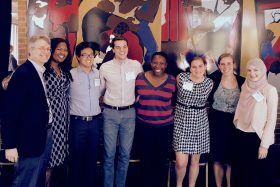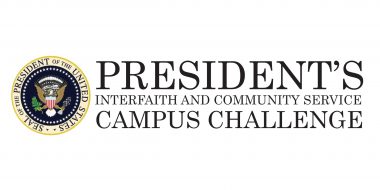The Elon group took part in a workshop on "Navigating Privilege and Identity in Multifaith Engagement" for the President's Interfaith and Community Service Campus Challenge.

Elon also was acknowleged as a school “with distinction” on the President’s Interfaith and Community Service Honor Roll.
The Sept. 10-11 national gathering included students, faculty, staff and administrators from colleges and university across the United States, as well as leading interfaith and nonprofit organizations that engage diverse religious communities in community service and working together to promote the common good. This year’s conference included a video address from President Barack Obama, as well as an interfaith panel led by Eboo Patel, founder and president of Interfaith Youth Core.
The workshop focused on the importance of addressing and “Navigating Privilege and Identity in Multifaith Engagement,” and highlighted recent and ongoing partnerships at Elon University between the Truitt Center and the Center for Race, Ethnicity, and Diversity Education and the Gender and LGBTQIA Center. Joel Harter, associate chaplain for Protestant life, began the workshop by acknowledging the assistance of Carla Fullwood, associate director for the CREDE, in planning the workshop presentation.

For example, a Muslim or Jewish student is more likely to identify “I am Muslim” or “I am Jewish” than a Christian student to say “I am Christian.”
Yasmine Arrington ’15, now a Howard Divinity School student, provided multiple examples of privilege. “We often think about white privilege or male privilege,” she said, “but there’s also right-handed privilege. Imagine being left-handed and walking into a classroom full of only right-handed desks.”
Following a video demonstrating a “privilege walk,” Elon sophomore Olivia Arges shared examples of Christian privilege. Christians can expect time off for their major holidays, and they can easily find food, decorations and music for their major holidays. That’s often not the case for members of other faiths in our society.
Elon’s presentation concluded with Diana Abrahams, multifaith coordinator, and Anna Torres-Zeb, coordinator for Muslim Life, sharing about how Jews and Muslims experience Christian privilege at Elon and in American society generally. Two students from Georgetown University, Timothy Loh and Spencer Crawford, then discussed the politics and privilege involved in the sacred spaces that are often available to different religious traditions on college campuses.
During the follow-up discussion, Olivia Arges noted the value of neutral spaces, like Elon University’s Sacred Space, which are not identifiable with any tradition and used by multiple religious traditions.
“Shared spaces like the Numen Lumen Pavilion also create opportunities for interaction and building relationships among different religious communities,” Arges said.
Abrahams underscored the importance of including non-religious and religiously unaffiliated students in multifaith engagement, noting that words like “multi-faith” and even “spiritual” are inadequate to the inner lives of many students.


